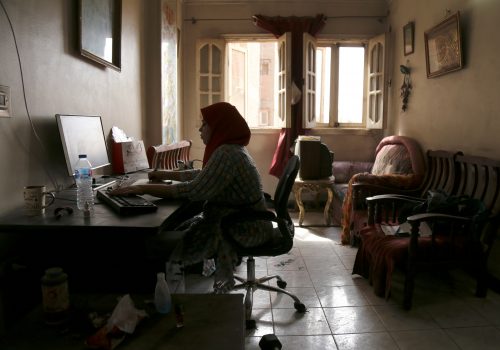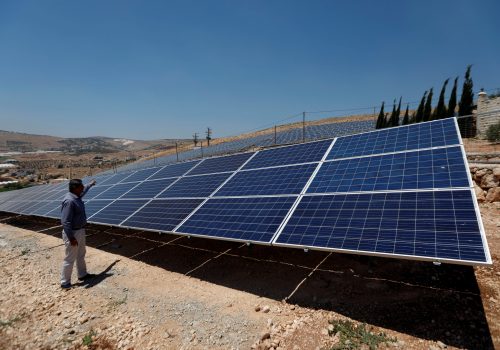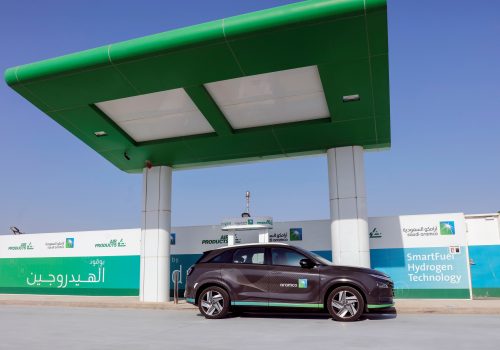Israel is becoming a cybersecurity guarantor in the Middle East. Here’s how.
As the United States pivots towards the Pacific, it has reduced its military footprint in the Middle East over the last decade. Its increasingly limited role remains centered primarily on countering Iranian threats through establishing regional alliances on multiple fronts. The Abraham Accords achieved under the Donald Trump administration in 2020—which normalized ties with Israel between the United Arab Emirates (UAE) and later Bahrain, and was extended to the North African countries of Morocco and Sudan—are viewed as a new era of security arrangements in the region.
These developments have had strong implications for cybersecurity in the Middle East. Such developments also empower Israel to become more of a security guarantor in the cyber field against Iran and other regional threats by filling the vacuum resulting from the US’s increasingly passive attitude towards the changing security dynamics in the region. However, Israeli cyber capabilities and positioning in the region remains a target for acquisition by China, which attempts to take stock of the contractionary US role.
In conjunction with the coronavirus pandemic, countries in the Middle East and North Africa (MENA) region are keen on accelerating the ongoing digital transformation, joining a global scramble for digital tools and infrastructure to respond to the pandemic’s challenges. Meanwhile, cyberattacks and lack of cyber-resilience—the ability to respond and recover from cyberattacks—in the region continue to harm business establishments and jeopardize economic interests, especially in the Gulf countries.
With that in mind, the shortcomings of the region’s cyber defense capacities remain significant. A study conducted in 2020 by the Ponemon Institute revealed that the average cost of a data breach incident incurred per company in the Middle East is $6.53 million—well above the global average incident cost of $3.86 million, raising its financial impact by 9.4 percent over the previous year. Moreover, the 2020 Cost of a Data Breach Report revealed that the average time taken to respond to breaches in the Middle East was “the slowest in the world.” Amid this massive vulnerability, Israel, with its advanced cyber capabilities, is viewed as the ideal partner by many Arab countries, particularly those in the Gulf.
GCC-Israel cyber ties
The provision of Israeli cybersecurity tools to the Gulf Cooperation Council (GCC) countries started long before the recent rapprochement. In 2007, the UAE recruited the Israeli-owned, US-based firm 4D Security Solutions to help raise the defense capacity around sensitive energy facilities and to set up a “smart” surveillance system across Abu Dhabi. In 2017, former Israeli Knesset member turned venture capitalist, Erel Margalit, stated that Saudi Arabia received assistance from Israeli cybersecurity firms to deal with a cyberattack on Saudi Aramco, the oil and natural gas company, in 2012. He also alleged that Israeli companies had talks with the Kingdom’s Public Investment Fund to assist in building Neom, the smart Saudi city.
Following the Abraham Accords in 2020, UAE-Israeli cyber cooperation has witnessed major advancements. In an April interview with Haaretz, Mohamed Al-Kuwaiti, the UAE cyber czar, said that there is “good information-sharing between us”—referring to cyber intelligence cooperation between both countries in response to a cyberattack conducted by the Hezbollah-affiliated Lebanese Cedar advanced persistent threat group in January.
Israel’s shared concerns with the GCC countries over Iran’s cyber threats are pivotal in their cyber cooperation. During this year alone, Saudi Arabia and UAE have been targeted twice with major cyberattacks by suspected Iran-affiliated hackers. Moreover, Iran is active on the disinformation front creating a network of websites and accounts used to spread false information about GCC countries, Israel, and the US. Even countries with comparatively small economies in the Gulf, such as Bahrain, have been targeted by hackers linked to Iran infiltrated networks.
However, Israel’s cyber cooperation with Arab countries extends beyond the core domain of its conflict with Iran to North Africa as well. In early July, a cyber-agreement was signed between Israel and Morocco, enabling cyber security teams to exchange information about cyber security threats and hacking attempts. It’s worth noting that Morocco is one of four Arab countries—besides Bahrain, Saudi Arabia, and the UAE—that reports claim has used Pegasus spyware, designed by Israeli surveillance company NSO Group. The suspected countries deny the allegations. This comes in tandem with the US move to relocate Israel to the US military’s Central Command (CENTCOM) area of responsibility, which coordinates US defense operations in the Middle East with its partners and prioritizes Iran and non-state terrorist groups as primary threats.
China’s role in MENA cybersecurity
While there are developing cybersecurity ties between certain Arab countries and Israel, China is also gaining a foothold in the region. China’s investment craft combined with active cyber-diplomacy boosts Beijing’s positioning in the cyber field in MENA. In March, China and the Arab League signed a data security cooperation initiative that aims to “position the partners as strong players in the formation of international regulations as well as further efforts towards a more cohesive structure of global digital governance.” The move comes in the context of the Chinese Global Initiative on Data Security by which Beijing is attempting to influence the international debate over data privacy norms and standards.
The Chinese initiative was announced in September 2020 as a response to the American Clean Network Initiative for 5G launched by the Trump administration a month earlier. While Beijing claims to target no third party, Washington explicitly said it is working on excluding Chinese information technology vendors, especially those associated with the Chinese Communist Party, from US and allied 5G mobile networks.
It’s worth mentioning that the US initiative received no positive response from MENA region, despite multiple calls to several Arab countries, including Saudi Arabia and the UAE, who were more likely to perceive the program as an antagonizing step towards China, their main oil importer. Since taking office in January, the Joe Biden administration seems not keen on resuming the Trump era initiative. Additionally, the Chinese Digital Silk Road Initiative harnesses Beijing’s influence in the region through investment opportunities offered by Chinese tech giants in 5G networks and digital surveillance.
As for Israel, the Chinese investment portfolio is challenging the longstanding traditional presence of the US by making acquisitions in Israeli high-tech startups growing from $76 million in twenty deals in 2013 to $325 million in fifty-two deals during only the first three quarters of 2018. On average, direct Chinese investments capture 30 to 40 percent of the total capital raised in deals with their involvement per quarter.
Interestingly, last August, cyber security firm FireEye revealed that a massive Chinese-backed cyber-attack hit dozens of Israeli government and private organizations and other targets in the Middle East. The attack is believed to have focused primarily on Israeli entities from the fields of high-tech, telecommunications, defense, academia, and information technology to acquire the Israeli know-how in cybersecurity, renewable energy, agricultural technologies, and 5G communications.
Even if it appears like China is gaining more influence in the MENA cyber field, Arab countries, particularly those in the Gulf, seem to be more open to cooperating with Israel, with whom they share serious concerns about Iran. Additionally, Israel leverages itself as a regional partner that is technologically capable of helping MENA countries to avoid tradeoffs between the US and China, which prevents losing one over the other in the global cyber race. Still, China’s active infiltration attempts are more likely to maneuver around Israeli cyber capabilities to direct these capabilities towards Beijing’s own interests.
Islam Al-Halawany is a senior research analyst with expertise in the public sector in MENA region. He has worked previously for research and training centers affiliated with the Cabinet of Egypt as an economic policy researcher for the Information and Decision Support Center, and as a research assistant at the Cairo International Center for Conflict Resolution, Peacekeeping, and Peacebuilding.
Further reading
Tue, May 11, 2021
Co-opting cybersecurity in Egypt
MENASource By
Cybersecurity is one of several frequent and overlapping justifications for censorship by the Egyptian government, in addition to strengthened counterterrorism and media regulation.
Tue, Sep 1, 2020
Energy cooperation in the Middle East is a necessary step toward regional security
MENASource By Ariel Ezrahi
Mutual energy dependencies can help mitigate political tensions, creating incentives to cooperate and possibly facilitating a positive momentum towards solving some of the MENA region’s thornier outstanding political conflicts
Tue, Jul 6, 2021
Ensuring our energy security in a sustainable way in the MENA region and beyond
MENASource By Ariel Ezrahi
In our globalized world, providing energy needs and combating climate change will require cooperation across borders. If the Biden administration is to be successful in promoting affordable and cleaner sustainable energy at home and abroad, it will be critical to engage with partners across the globe, particularly in the Middle East, where much of the world’s oil is produced.
Image: A man walks past the logo of Israeli cyber firm NSO Group at one of its branches in the Arava Desert, southern Israel July 22, 2021. REUTERS/Amir Cohen


